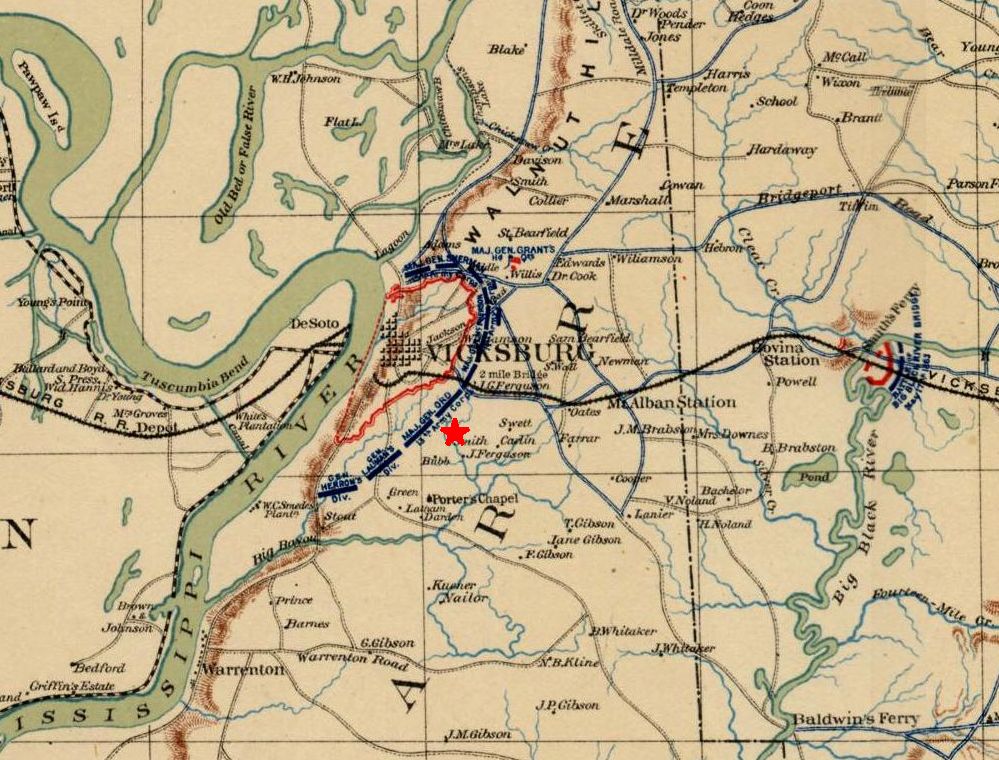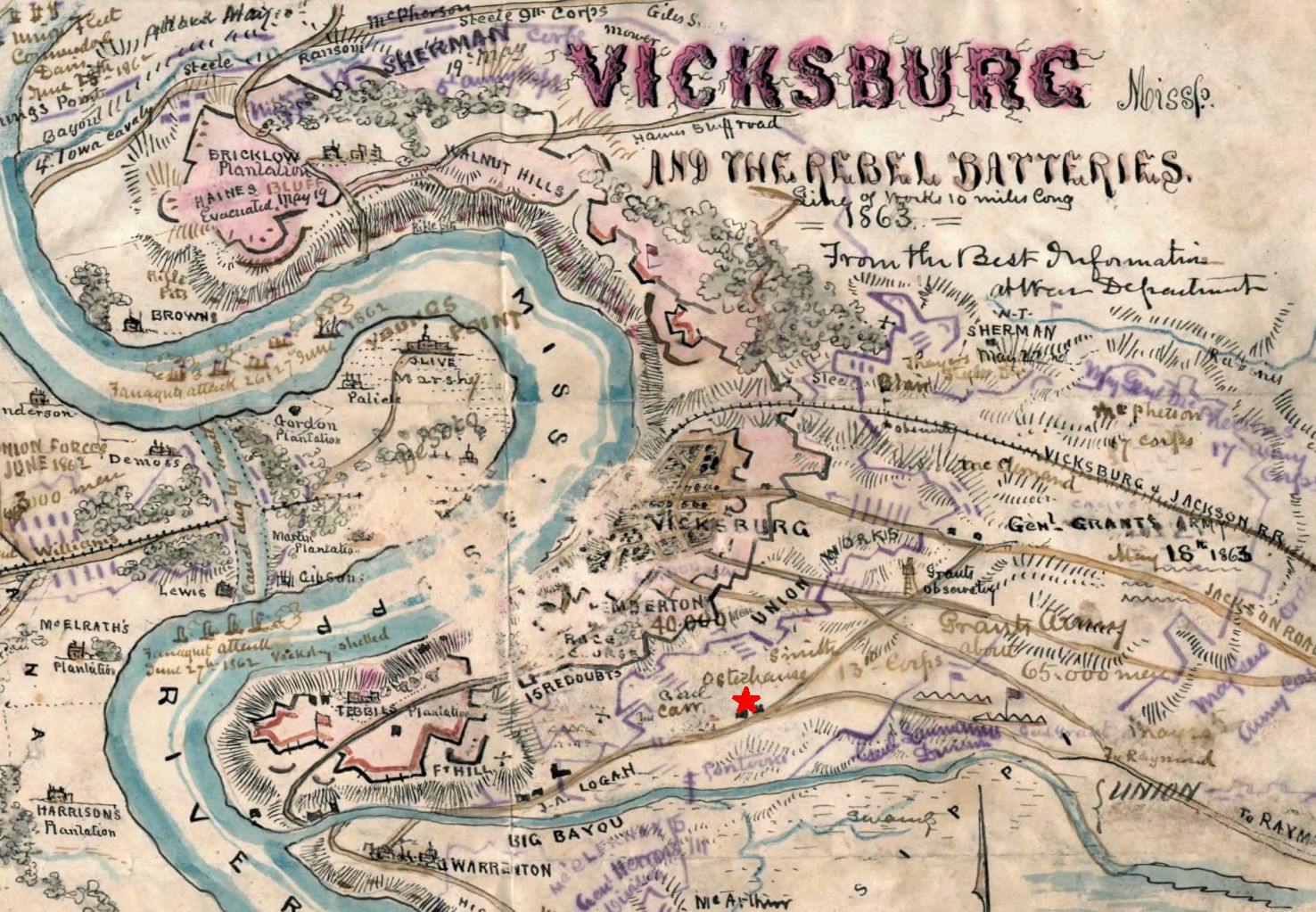| Previous Date | Day By Day Index | 16th OVI Home Page | Next Date |
Where was the regiment on
Friday, May 22, 1863
On this day, after two days of a rather tenuous rest, Grant ordered his second frontal assault on Vicksburg. The 16th Ohio, under Gen. Osterhaus, participated in the general attack, losing at least five men killed. Private Peter Perrine, Company C, simply states:
A charge was made along the whole line but proved unsuccessful.
Corporal Theodore Wolbach, Company E, gives colorful and poignant detail on the action of this day:
In looking back to the stirring episodes of that battle month, the 22nd of May, with its memorable and appalling work, recurs to the memories of the surviving participants with the clearness of some deep implanted dream.
The sun of the 22nd rose clear and seemed to indicate the beautiful day that followed. Skirmishers were busy on both sides with the most firing by the Federals. Our entrenched batteries planted their shots languidly into the enemy's lines. The troops were officially informed of the general assault that was to be made that day. Subordinate officers were posted on the signals to be given. About midday our land batteries began to be worked rapidly. The roar of the simultaneous discharge of many pieces, supplemented by the explosion of numerous shell, was deafening. The mortars and heavy gunboat ordnance above DeSoto point beyond the doomed city joined the mammoth bombardment; but only at rare intervals could we hear this firing that sounded much like the echo of the cannonading near us. Clouds of dirt, fragments of timber and other material flew up from the rebel works, but to all this savage demonstration came no reply from the Confederate thousands that crouched low in their well-built rifle-pits. Suddenly the firing ceases and twenty thousand men, at the word of command, rise from behind ridges and out of ditches and other places of concealment and start forward. Instantly the works in front are fringed with butternut and gray, and blazing with a musketry fire that has never been surpassed in the annals of war. The line faltered a moment, then broke, taking to cover in the advanced position gained, or falling back to the starting point. Repeated attempts were made to gain advantageous positions, but every effort was met and defeated by a fierce fire that was delivered with fatal accuracy. All along that lurid front, from McClernand's extreme left to the swamp lands of the Yazoo, the battle raged with sublime fury. From the summits of those long limes of yellow earthworks and forts which Gen. Sherman has since pronounced stronger than the works at Sebastopol, the stubborn Confederates poured their shotted, life-consuming flame on the exposed Federals who were facing obstacles that no human valor could surmount. In a very short time four small brigades of the 13th corps had about a thousand men shot down.
The blue-coats fought with the will of men,
They charged the strongworks again and again,
And answered back to the rebel yell,
And clung to the ground where their comrades fell,
'Till the arid slopes were covered with dead,
Then abandoned the ground that with blood was red,
And fled to cover behind the crest,
But no Confederate followed or bared his breast.
* Believed to be original poem by Cpl. Wolbach
The men devoted the night of the 22nd to removing and burying as many of the dead as were safely accessable [sic] from our lines and without too seriously jeopardizing more lives.
Our army had boldly attacked and was severely repulsed. This no doubt improved the morale of Pemberton's men, who now felt assured that they had brought their victorious foe to a standstill and could prevent them from gaining any signal advantage under present circumstances. The only success (if in this case is a proper term) that had been gained along the whole line, was by some of Carr's men, who gained temporary possession of a large lunette. As this was commanded by other works from the rear, almost every man that entered it was shot down.
Sergeat [sic] Joseph Griffith, with marvelous pluck and presence of mind, compelled a rebel Lieutenant and thirteen men to surrender and marched them rapidly out into our lines. A colored sergeant of Lawler's brigade stuck his flag on the top of the lunette and with a few men stayed on the outer slope until night, when they retired under cover of darkness.
The 2nd brigade, 9th division, 13th army corps, bore a conspicuous part in the bloody work and the courage displayed by them when they approached the rim of that fiery crater, in that holocaust of death would have done honor to Napoleon's veterans.
The 22nd Ky., 114th, 42nd and 16th Ohio, with their diminishing and bleeding ranks, reluctantly did what every Federal organization along that fiery front was compelled to do that day--give up the idea of carrying the works by storm and settle down to regular seige [sic] operations. Although we had been foiled in an attempt of unsurpassed magnitude and lost many noble men the earnest willingness to perform the hazardous duties of a beseiging [sic] army yet remained. Before the capitulation the many perforated heads inside the beleagued [sic] lines bore grim testimony of the keen watchfulness and accurate firing of the western riflemen.
* Information and italicized quotations from a series of articles entitled Camp and Field - The Old 16th Ohio, written in the 1880s by Theodore Wolbach, late Corporal in Company E, 16th Ohio Volunteer Infantry.
Period map showing the approximate position of the 16th Ohio with Gen. Osterhaus' division under Gen. McClernand (later under Gen. Ord as shown below). This approximate profession would be from where the 16th Ohio attacked the Rebel works on this day:

A rather colorful, period map showing the various military works and units around Vicksburg during May through July, 1863. This map shows Gen. Osterhaus' Division which included the 16th Ohio:

| Previous Date | Day By Day Index | 16th OVI Home Page | Next Date |